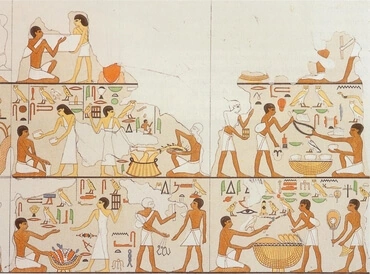1
OR questi sono i nomi de’ figliuoli d’Israele, che vennero in Egitto: essi vi vennero con Giacobbe, ciascuno con la sua famiglia.
2
Ruben, Simeone, Levi, e Giuda;
3
Issacar, Zabulon, e Beniamino;
5
E tutte le persone, uscite dell’anca di Giacobbe, erano settanta. Or Giuseppe era già in Egitto.
6
E Giuseppe morì, e tutti i suoi fratelli, e tutta quella generazione.
7
E i figliuoli d’Israele fruttarono e moltiplicarono copiosamente, e crebbero, e divennero grandemente possenti, talchè il paese fu ripieno di essi.
8
Or sorse un nuovo re sopra l’Egitto, il qual non avea conosciuto Giuseppe.
9
Costui disse al suo popolo: Ecco, il popolo de’ figliuoli d’Israele è più grande e più possente di noi.
10
Ora procediamo saggiamente intorno ad esso; che talora non moltiplichi; onde, se alcuna guerra avvenisse, egli non si congiunga anche esso co’ nostri nemici, e non guerreggi contro a noi, o se ne vada via dal paese.
11
Furono adunque costituiti sopra il popolo d’Israele commissari d’angherie, per affliggerlo con le lor gravezze. E il popolo edificò a Faraone delle città da magazzini, cioè, Pitom e Raamses.
12
Ma quanto più l’affliggevano, tanto più cresceva, e tanto più moltiplicava fuor di modo; onde gli Egizj portavano gran noia de’ figliuoli d’Israele.
13
E gli Egizj facevano servire i figliuoli d’Israele con asprezza.
14
E li facevano vivere in amaritudine, con dura servitù, adoperandoli intorno all’argilla, e a’ mattoni, e ad ogni servigio de’ campi; tutta la servitù, nella quale li adoperavano, era con asprezza.
15
Il re di Egitto disse ancora alle levatrici delle donne Ebree, il nome dell’una delle quali era Sifra, e quel dell’altra Pua:
16
Quando voi ricoglierete i parti delle donne Ebree, e le vedrete in su la seggiola, se il parto è un figliuol maschio, uccidetelo; ma se è una figliuola femmina, lasciatela vivere.
17
Ma quelle levatrici temettero Iddio, e non fecero secondo che il re di Egitto avea loro detto; anzi lasciarono vivere i fanciulli.
18
E il re di Egitto chiamò le levatrici, e disse loro: Perchè avete voi fatto questo, di lasciar vivere i fanciulli?
19
E le levatrici dissero a Faraone: Le donne Ebree non sono come l’Egizie, perciocchè sono vigorose; avanti che la levatrice sia venuta a loro, hanno partorito.
20
E Iddio fece del bene a quelle levatrici; e il popolo crebbe, e divenne grandemente possente.
21
E perchè quelle levatrici temettero Iddio, egli edificò loro delle case.
22
Allora Faraone comandò a tutto il suo popolo, dicendo: Gittate nel fiume ogni figliuol maschio che nascerà, e lasciate vivere tutte le figliuole femmine.







